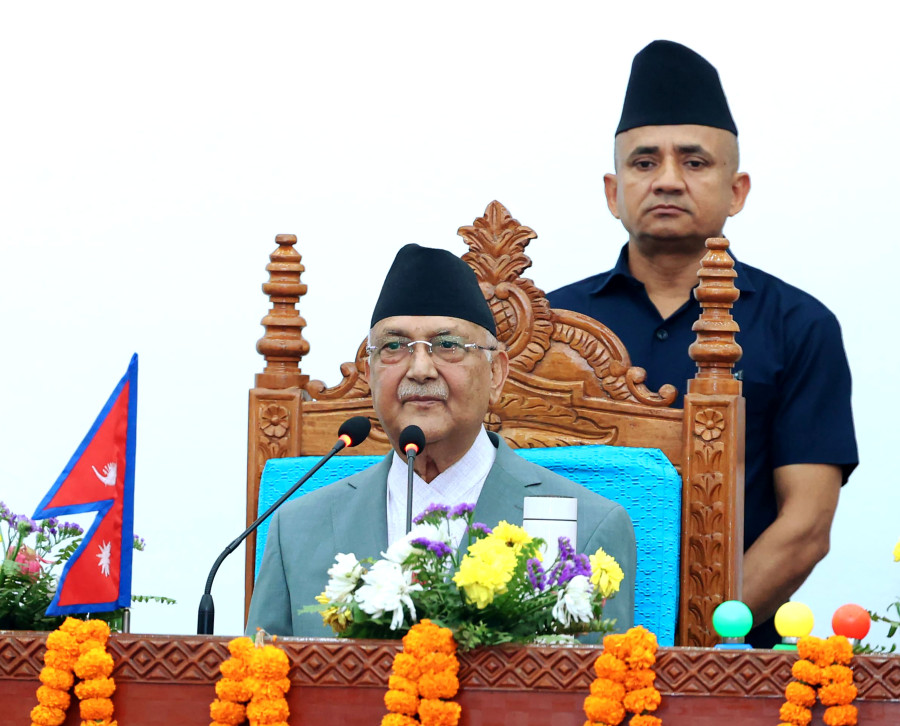Politics
Oli’s address leaves Madhesh provincial assembly members unimpressed
PM criticised for failing to commit to police integration, endorsement of federal civil service Act.
Binod Ghimire
Since February, Prime Minister KP Sharma Oli has been busy addressing provincial assemblies. He delivered a speech in Lumbini Provincial Assembly on February 5, then in Karnali and Sudurpaschim later the same month.
On Tuesday, he appeared before the Madhesh Provincial Assembly, where he went at length about his efforts to resume Janakpur-Jaynagar railway line, construct Sunkoshi Marin diversion project and expedite construction of postal highway, among others. He also talked in detail about the need of protecting and strengthening national interest and sovereignty.
“It is high time for all tiers of governments to come together to further institutionalise the present system,” he said, warning some undemocratic forces are resorting to violence in an attempt to overturn the hard-earned political gains. Oli also spared a good amount of time to claim Nepal has maintained good relations with neighbouring countries.
“It is natural for the neighbours to have minor problems,” he said. “Unlike what many claim, we enjoy cordial relations with both the neighbours. There are no big issues with them.”
Oli also said the Constitution of Nepal would be amended at the right time. “A committee will be formed to assess what revisions are necessary in the statute and the amendment process will be initiated accordingly,” he said.
Oli ended his 75-minute speech by saying, “The federal government is always ready to work hand in hand with the Madhesh Province for its development and prosperity.”
His long speech, however, couldn’t impress the provincial assembly members, mainly from the opposition. They claim Oli made no concrete announcements for the province, which lags behind in both social and economic development.
Oli also failed to say what efforts his government was making to equip the provinces with necessary laws and resources to make federalism function effectively, they complain.
“It was a very ritualistic speech,” Manish Suman, a Janata Samajbadi Party-Nepal provincial assembly member, told the Post. “It seems he came to demonstrate his oratory skills, which he has mastered. He spoke. We listened. That is the only outcome.”
Suman said they were expecting Oli to announce some projects for Madhesh and some commitment for police integration. The provincial assembly members were waiting for him to commit to police integration and endorsement of the federal civil service Act, said Suman.
On December 6, 2023, the Madhesh Provincial Assembly had unanimously endorsed a resolution motion registered by the CPN-UML which says that provinces should be allowed to exercise all the authorities delegated to them by Schedule 6 of the Constitution of Nepal. “It was surprising that he did not say anything about the resolution passed at the initiation of his own party,” said Suman.
Despite reiterated commitments, the successive governments have shown no interest in integrating Nepal Police in the provincial force. They have been claiming the Police Personnel Adjustment Act and the Act to Govern the Operation, Supervision and Coordination of Nepal Police and Provincial Police Forces need revision before the integration.
But experts on federalism refuse to accept the claim.
“There is no legal barrier in police integration. The federal government simply doesn’t want it,” Khim Lal Devkota, former National Assembly member, told the Post. Devkota, who is an expert on federal affairs, agrees with Suman’s claim that Oli must have been able to make commitments to strengthen federalism during his address.
“I welcome the prime minister’s initiative to address the provincial assemblies but that needs to yield some positive results,” Devkota said. While provinces are yet to get police around 10 years after the constitution came into force, most of the local and provincial governments are short of civil servants.
A study by the Federalism and Localisation Centre led by Devkota shows the local level is still short of over a third of the needed civil servants, who are still largely mobilised from Kathmandu.
Only 43,807 positions among the 67,719 sanctioned posts have been filled, with 36 percent vacant positions. The situation is no better at the provincial level—the study shows that 13,821 positions of the 22,236 are vacant in the seven provinces.
The pattern of Oli’s address has been similar in all the provinces. He starts by highlighting the development works initiated by his government, dwells on specialities of the particular province, talks about his goal of “prosperous Nepal” and brief Nepal’s diplomatic relations. While he talks about strengthening federal republicanism, he fails to commit to addressing the issues facing the provinces in fully enjoying their constitutional rights.
The UML provincial members, however, refused to buy the argument.
“In every address, the prime minister has expressed his commitment for federal republicanism. Don’t provinces automatically come under federalism?” Chakra Bahadur Malla, the party’s chief whip from Sudurpaschim, said. “The prime minister addressing the provincial assemblies itself is a testimony to his commitment for provinces. I don’t understand why opposition parties don’t want to acknowledge the simple fact.”




 8.43°C Kathmandu
8.43°C Kathmandu















